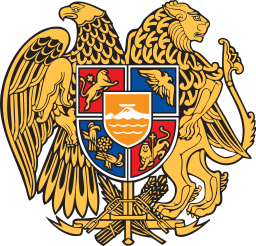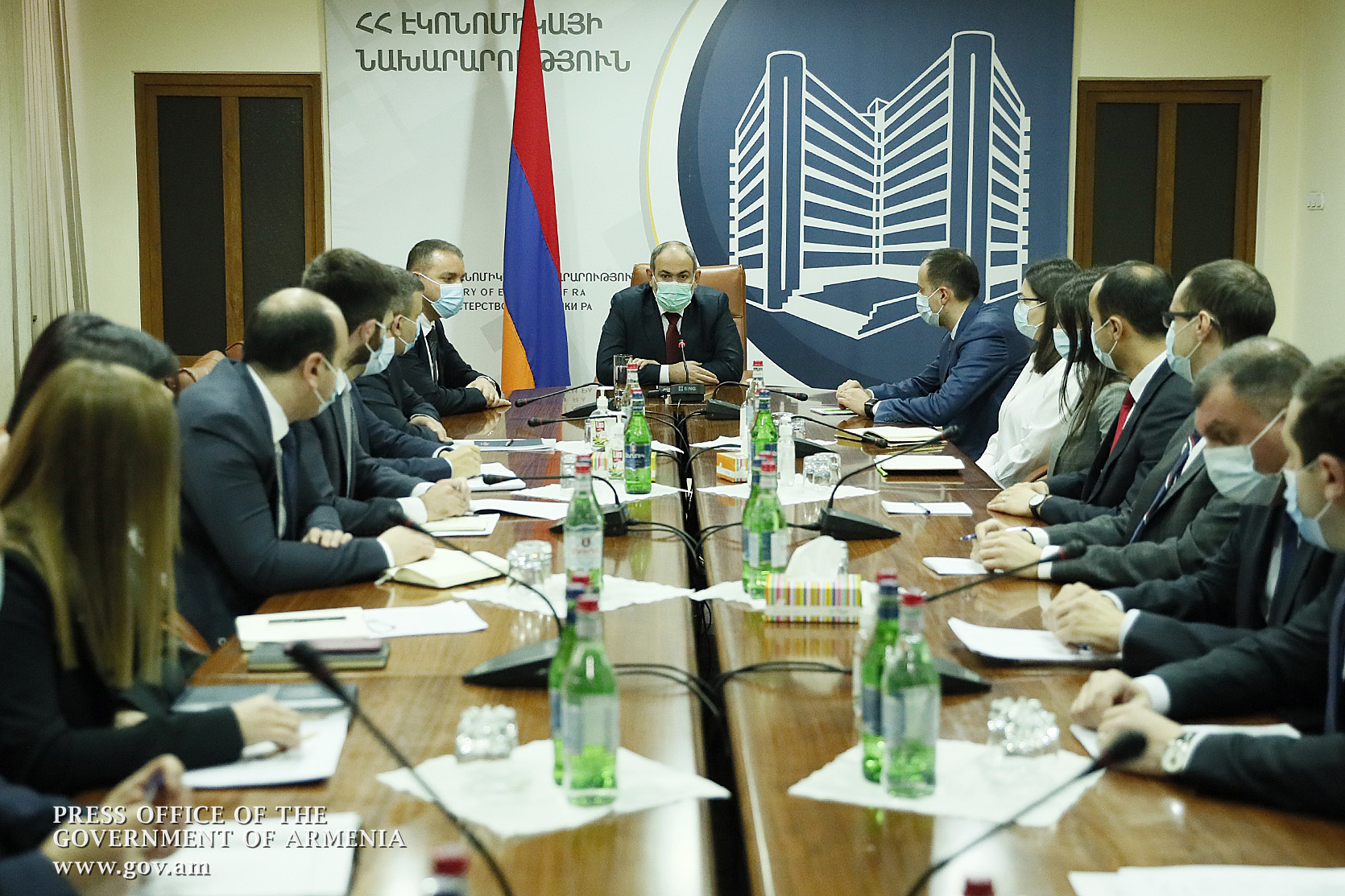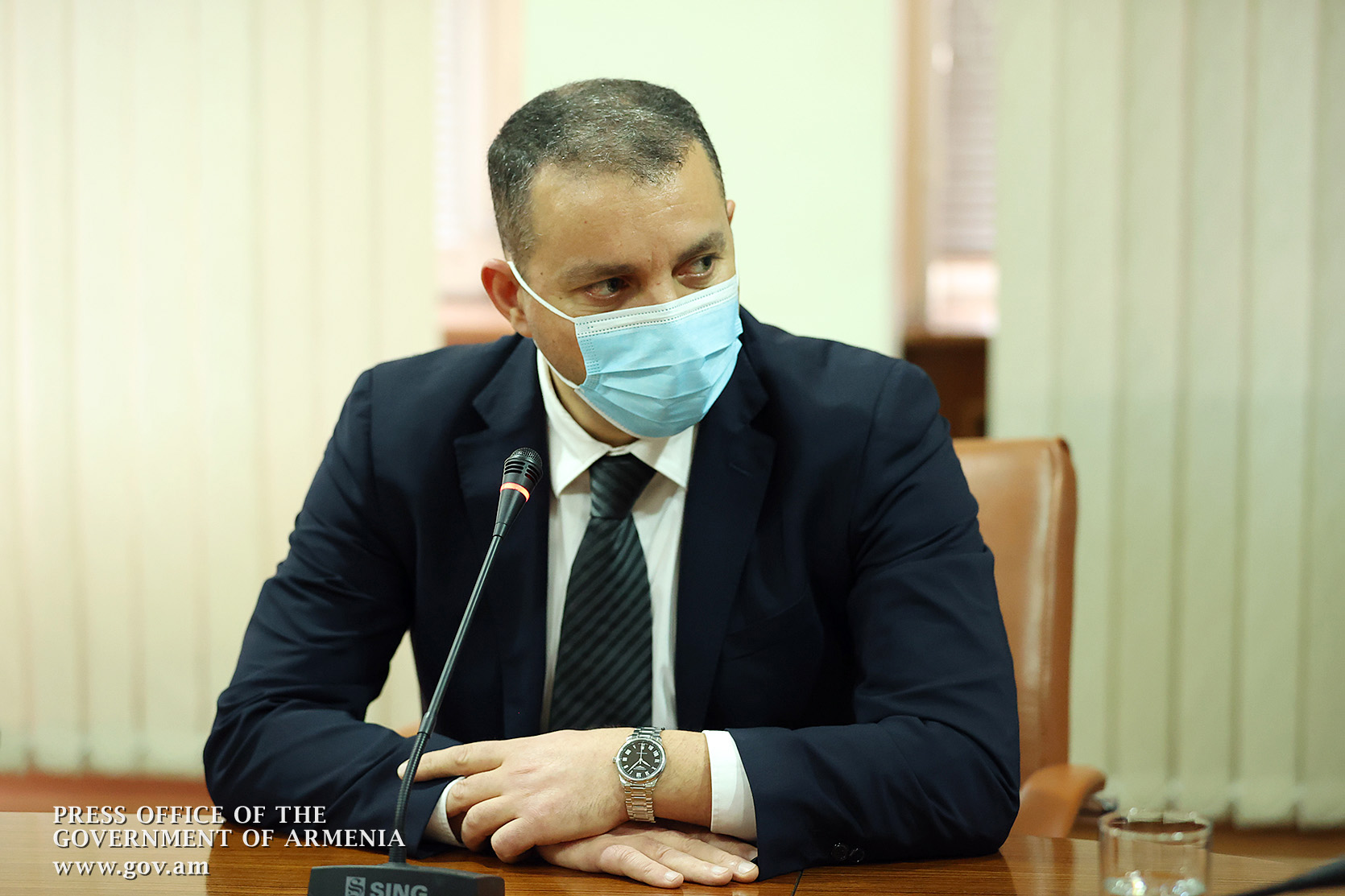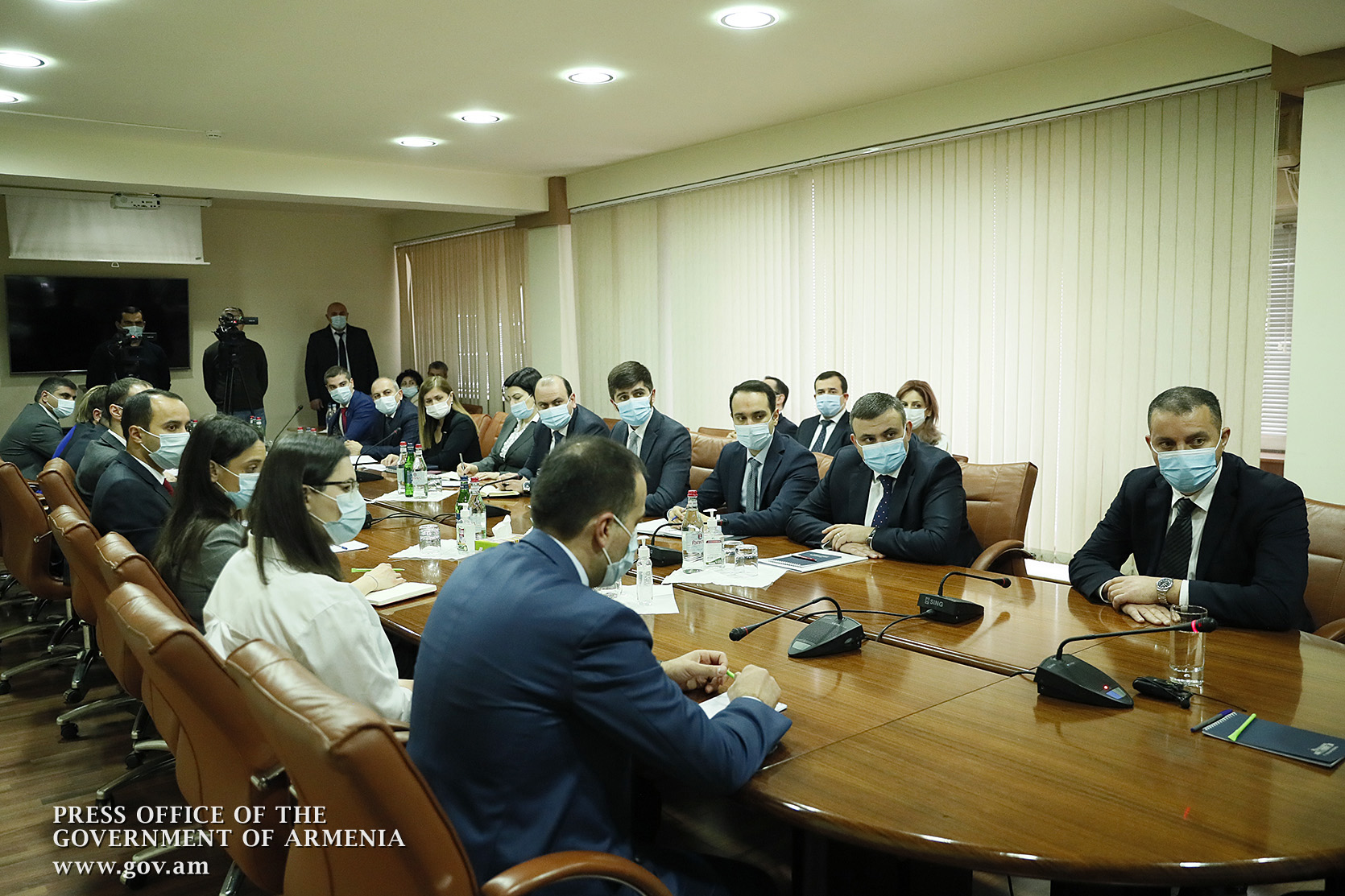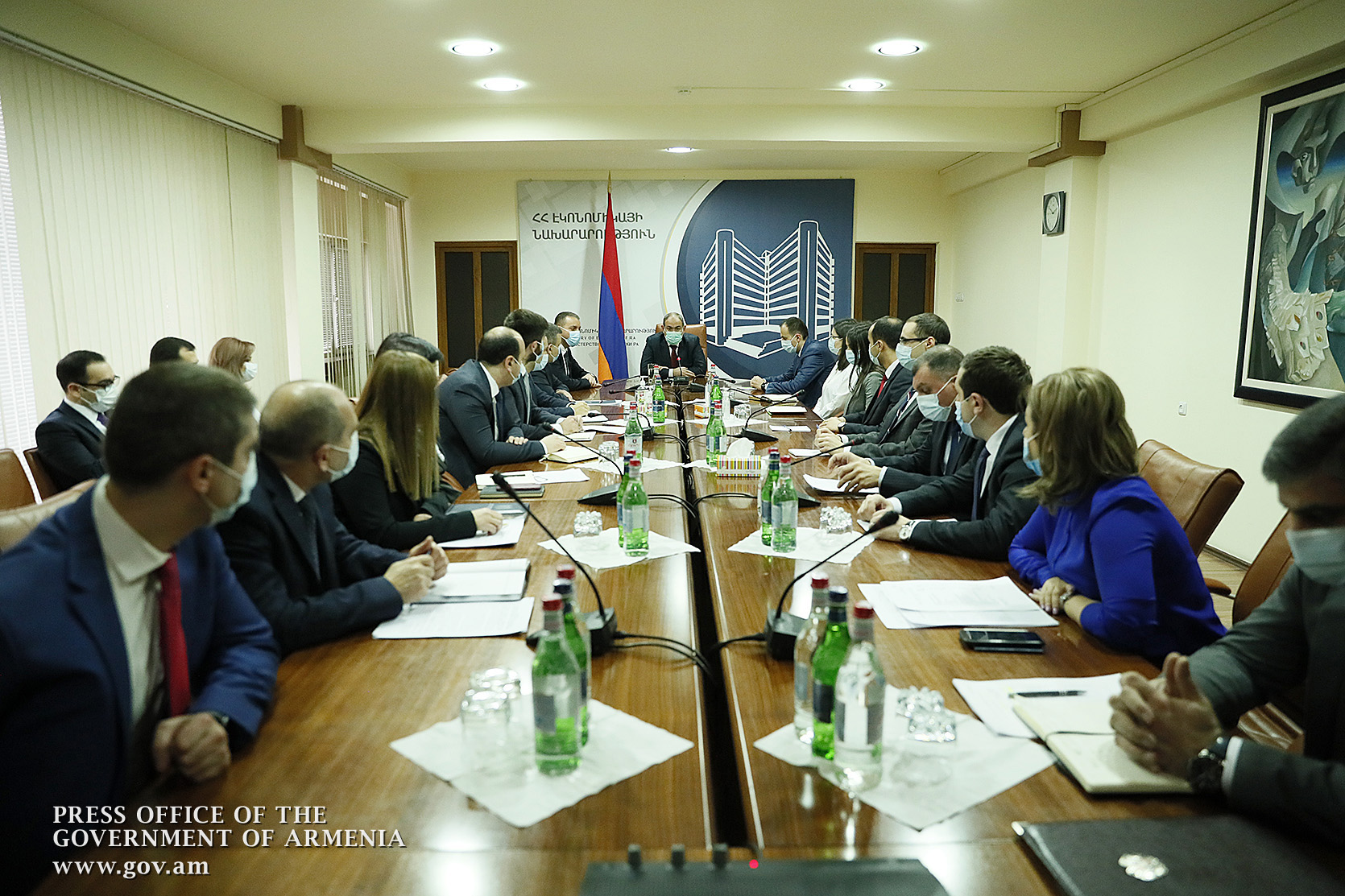“Our next task is to restore the economy and simultaneously formulate a development agenda” - PM holds consultation at the Ministry of Economy
Prime Minister Nikol Pashinyan today called at the Ministry of Economy to discuss the Ministry’s ongoing and upcoming programs. The meeting was attended by Chief of the Office of the Prime Minister Arsen Torosyan, Minister of Economy Vahan Kerobyan, the deputy ministers, the heads of Ministry of Economy-affiliated agencies, other dignitaries.
Before discussing the meeting agenda, the Premier referred to Armenia’s socio-economic situation amid the global pandemic and following the war. “Before moving on to the actual discussion, I would like to draw your attention to the following fact. The Republic of Armenia has been in a state of crisis management for a year now. In March, 2020, the coronavirus was officially registered in Armenia, as in many countries around the world, which led to a socio-economic, health and humanitarian crisis. All the way through the crisis we saw others cite examples of how to manage the situation. But today Armenia itself can set an example to other countries in terms of crisis management.
I wish to draw the public’s attention to the fact that this issue used to be raised round the clock in June, July, August, to which answered that the story was not over yet, and we all ought to wait until the final results are summarized. Today no one remembers what our critics said in June, July or August. But we must remember the accusations about our inability to handle the crisis that we faced in June, July, and August.
The war was the next challenge. Coupled with the coronavirus crisis, the war could result in a macroeconomic collapse. It should be noted that we were facing such a challenge. But today we can confidently state that we managed to maintain the macroeconomic stability, and ultimately get international recognition of Armenia’s economic stability through increased issuance of Eurobonds, because the most visible, tangible assessment a country’s economic position is the trust shown by institutional investors. After all, it is a powerful indicator of confidence.
I would also like to draw your attention to the fact that we managed to issue the Eurobonds at the lowest-ever interest rate in the history of the Republic of Armenia. What does this mean? This means that institutional investors believe in Armenia’s economic and political future. And today we need to formulate what we are going to do next.
I would like to state the following fact. We have had a crisis year, but we also had a non-crisis year before that. The results of 2019 were brilliant in all respects, including the economic indicators. Of course, 2020 was a year of crisis: the consequences of the war were too bitter for us. In the meantime, as I mentioned above, we were able to live up to the task in terms of crisis management.
Rehabilitation is the second task we have set, and the next task is to return to the development agenda in parallel with the restoration. And, of course, the Ministry of Economy has to play a key role in this regard. Today we will see what we have outlined, what we are going to do, and what kind of guarantees we have set up. It is crucial to ensure that our plans come true: what we write on paper or what we have in mind must be materialized in practice,” the Prime Minister said.
Then, the meeting took note of the work done to resume economic growth and improve the business environment. The speakers made a point of expanding the range of Armenian products exported to foreign markets, including the Eurasian Economic Union, the European Union, the United States and other regions.
Armenia has set up more than 30 intergovernmental economic commissions with foreign partners, which regularly take up issues related to the furtherance of economic ties, addressing legislative bottlenecks, holding business forums in an effort to help the local producers get new partners abroad and master new sales markets.
It was reported that discussions held within the EAEU have resulted in a number of important decisions, among which the possibility for EAEU-registered entities, inclusive of Armenian companies, to participate in public procurement tenders in the Russian Federation. The relevant decision will come into effect in June this year. Armenian companies will be able to participate in Russian public procurement tenders in 10 spheres, including light industry, construction, military industry, etc.
Prime Minister Pashinyan stressed the need to provide detailed information to local companies, noting that it could open up a vast field of activity for businesses with serious development prospects.
Armenia's trade missions are being renewed and upgraded abroad, which can lead to increased exports in specific spheres and wider availability of Armenian products in foreign countries. Work is being done to increase the export potential of Armenian wines, alcoholic beverages, canned and other types of food. This is largely facilitated by the GSP + system with the EU, and the GSP systems with the United States, Canada, and Switzerland.
Issues related to public-private partnership, promotion of public investment, improvement of the applicable legislative framework were discussed during the meeting.
The Investment Support Center is currently discussing 60 specific projects with investors to a total cost of USD 1.5 billion. Some projects are being implemented now. The Center keeps in close touch with investors and helps them deal with the existing problems.
Referring to investment programs, the speakers noted that there is great interest from investors, especially in the field of reservoir construction. The Prime Minister prioritized the construction of new reservoirs in the country, emphasizing that water is going to become a key regional factor over the time. In this context, Nikol Pashinyan stressed the need to take consistent steps towards liberalizing the water market and expanding the coverage of arable land.
A number of other issues related to losses and leaks at gas stations, the development of the institute of standards, the overall improvement of the business environment were discussed during the meeting.
BUSINESS ENVIRONMENT
(+374 11) 597 539
- BUSINESS ENVIRONMENT
- (+374 11) 597 539
TOURISM
(+374 11) 597 157
- TOURISM
- (+374 11) 597 157
QUALITY INFRASTRUCTURES
(+374 11) 597 167
- QUALITY INFRASTRUCTURES
- (+374 11) 597 167
PRODUCT LABORATORY TESTING
(+374 11) 597 166
- PRODUCT LABORATORY TESTING
- (+374 11) 597 166
